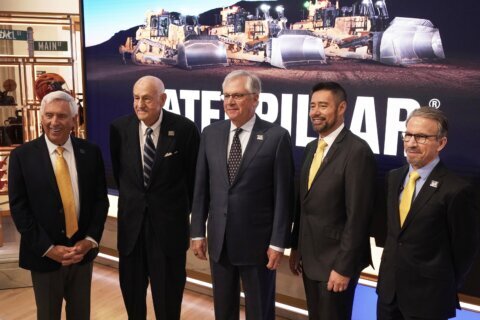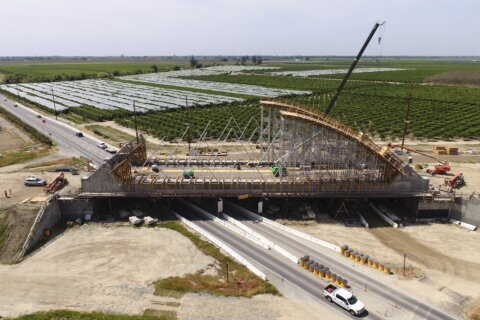HELSINKI (AP) — The European Union’s border agency said Thursday that it will send dozens of officers and equipment as reinforcements to Finland to help police its borders amid suspicion that Russia is behind an influx of migrants arriving to the country.
Frontex said that it expects a “significant reinforcement” made up of 50 border guard officers and other staff, along with patrol cars and additional equipment, to be put in place as soon as next week.
More than 800 migrants without proper visas and documentation have arrived in Finland so far since August, with more than 700 in November alone by the end of Wednesday — compared to a few dozen in September and October. They include people from Afghanistan, Iraq, Syria, Yemen, Kenya, Morocco and Somalia.
Finnish Prime Minister Petteri Orpo, who addressed lawmakers at Parliament on Thursday, called the situation “a serious disruption of border security” that affects the national security of Finland, whose population is 5.6 million.
“Finland cannot be influenced, Finland cannot be destabilized,” Orpo said with a decisive tone. “Russia started this, and Russia also can stop it.”
The Kremlin denies the allegations.
On Wednesday, Finnish border guards and soldiers began erecting barriers, including concrete obstacles topped with barbed-wire at some crossing points on the Nordic country’s lengthy border with Russia.
The government decided to close four busy Russia border crossings in southeastern Finland last week over suspicions of foul play by Russian border officials. It plans to only leave one Arctic crossing point open for migrants seeking asylum.
Frontex Executive Director Hans Leijtens said that sending border reinforcements is “a demonstration of the European Union’s unified stand against hybrid challenges affecting one of its members.”
Finland has nine crossing points on the border with Russia, which runs 1,340 kilometers (830 miles) and serves as the EU’s easternmost frontier as well as a significant part of NATO’s northeastern flank. Finnish authorities believe that Russia has become more hostile toward Finland since the country joined NATO in April.
Finnish border officials told The Associated Press on Wednesday that there’s been a remarkable change in Russia’s modus operandi at the Russia-Finland border zone, which is normally under the heavy control of Russia’s Federal Security Service, or FSB.
EU Home Affairs Commissioner Ylva Johansson said this week that the challenges on Finland’s border gave her a feeling of “deja vu,” two years after Belarus began driving migrants into Latvia, Lithuania and Poland in what European officials said was an attempt to destabilize the 27-nation bloc.
“The Finnish border is the EU’s border,” Johansson told EU lawmakers in a message of support to Helsinki. “The European Union is behind you. You can count on our full support to protect the EU border and uphold fundamental rights.”
Most of the migrants — many seen wearing sneakers in Finland’s harsh winter conditions — are young men in their 20s and 30s, but some are families with children and women, border guard data and photos indicate. Nearly all have arrived at the border zone on bicycles that Finnish and Russian media reports say were provided and sold to them.
The governor of Russia’s northern Murmansk region recently said the region would be put on “high alert” after Finland announced that it would close all border crossings between the two countries apart from one.
Gov. Andrei Chibis said that he expected the number of foreigners trying to cross to Finland from the last remaining open border post in the Murmansk region to “exponentially” increase.
Chibis said there were 400 people waiting to enter Finland at the more southerly Finnish Salla border post on Wednesday, of which only 50 were allowed to cross.
Estonia, Russia’s Baltic neighbor, has also seen a recent surge in number of migrants attempting to enter the country through a crossing point in the border city of Narva. About 30 migrants, mostly Somalis and Syrians, have been turned back to Russia in the past seven days after they didn’t seek asylum in Estonia.
“This is fully state orchestrated (by Russia). Fully,” Estonian Defense Minister Hanno Pevkur said during a news conference following a meeting with Nordic and Baltic defense ministers in Stockholm on Thursday.
“In Russia, there’s a border zone up to 10 kilometers (about six miles) that you cannot enter without the permission of the FSB. And so by accident, all these hundreds of migrants are ending up in one border crossing point in Finland with bicycles during the wintertime,” Pevkur told reporters.
“Come on, seriously?” he said.
___
Lorne Cook reported from Brussels.
___
Follow AP’s coverage of global migration at https://apnews.com/hub/migration
Copyright © 2025 The Associated Press. All rights reserved. This material may not be published, broadcast, written or redistributed.









